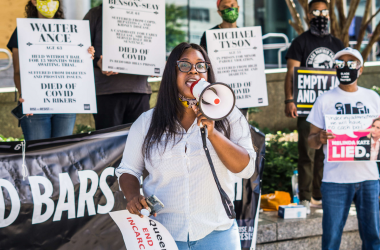I received the below e-mail in my inbox last night.
At first, I hit “delete.” But the contents of that e-mail stayed with me and was something to reflect on as I went about the rest of my (late) night, so I dug it out of my trash.
I don’t disagree with the premise of the e-mail. I know that politics is about more than panels, screenings and benefit parties and that these alone are not going to create a world free of oppression and violence.
I also know, from over 15 years of experience of acting, organizing and resistance, that panels and screenings are tools that *do* raise consciousness and can inspire action (rather than atrophy). I also know that benefit parties are necessary to fund the projects that can be lifelines to so many.
For example, almost 15 years ago, I was one of a small group of anarchists that started Books Through Bars–NYC, a group that originally sent free political literature to incarcerated women and youth nationwide as well as prisoners of all ages and genders in the Tri-State Area. The project mushroomed faster than expected, mostly because of the huge numbers of people in prison with an overwhelming need for reading material, especially material that helped them articulate some of what they already experienced.[1]
Fifteen
years later, I don’t think I can count how many requests for books
that I’ve filled. I do know that, even if we were to measure each box
of packages against how many lectures, panel discussions or screenings
I’ve ever attended, the packages would still win by a (literal)
landslide.
I also know that
the ability to mail packages out to the thousands of people in prison
that this particular BTB chapter has supported is only possible when we
do organize fundraisers, which include panel discussions, film
screenings (both political and non…but who’s to say that we always
have to be super-serious and can’t incorporate Monty Python’s Ministry
of Silly Walks into our political work?), dinner parties, bbqs and yes,
even an annual Bingo.
Are doing these fundraisers acts of resistance? On the surface, they may not look like what we typically think of as “acts of resistance.”
But let me ask this: Is sending reading material to a person in 24-hour solitary confinement an act of resistance? What about sending political literature that would never be stocked in the prison’s library (if the prison has a library….there is no nationwide mandate that prisons must have libraries for the people they cage) or chapel?
Is the act of sending a book to a person in prison an act of resistance? What about organizing the fundraiser that allows 100, 200, 300, 500 people in prison to receive books? Is that an act of resistance?
Who gets to frame what constitute legitimate acts of resistance?
I also wonder about the charge that words are a curse, a sleeping spell that impedes action.
As the author of a (now not-so-new) book on incarcerated women’s resistance and organizing, I’ve been on a lecture circuit. It’s probably not the typical lecture circuit that someone like, say, Angela Davis or Naomi Klein might be on. For the past year, I’ve been going around and talking about incarceration, how gender impacts incarceration (and vice versa), incarcerated women’s acts of resistance and organizing, and how people on the outside can get involved with supporting women’s resistance on the inside. I’ve probably done close to (if not over) 50 talks on the subject to audiences ranging from a high school class in Queens to formerly incarcerated men in Boston to college students with varying degrees of first-hand experience with incarceration.
Are my words “a sleeping spell made of strategic hedging and hesitations”?
After I spoke to a high school class, the woman who had invited me told me that, by the end of the day, the students were talking about forming a prison issues club to do what they could to address some of the issues I’d raised as to who goes to prison and why.
Is this single-handedly going to take down the prison system?
No. But it’s challenging the dominant notion, fed to so many of us, that people who end up in prison are bad people who need to be removed from society for our safety. It’s encouraging people to look at the context for who goes to prison and why and not just see it as history, but to see how history reaches out to us and affects (and entraps) us today. And then it pushes students to think about what *they* personally can do to change this unjust set of realities.
More recently, I spoke at the University of North Carolina in Chapel Hill. The audience was quiet, which made me wonder what, if anything, they were getting out of my talking myself hoarse. Then, last week, I opened my mailbox and found a note from the women’s club on campus. They said that, after coming into contact with me (and presumably also after hearing me talk about incarcerated women’s issues and resistance and not just admiring my cheong-sam), the club has decided to begin working on prison solidarity.
I could probably give more examples that challenge this notion that words are a sleeping spell, but I should get off the computer and start to respond to the pile of letters from women incarcerated nationwide (some of whom want to know about issues that I’ve been learning about through reading, listening and, on the rare occasion that I can find childcare, go to panel discussions and lectures. Because prisons will never ever voluntarily carry information about movements to stop the use of solitary confinement and supermax prisons). I should start addressing envelopes and sending out the latest issue of the zine I compile of their art and writings so that women across the country can know about the issues that affect their sisters in other prison and in other states. I should start figuring out where I can plug into the next fundraiser (I believe it’s a dance, but am not entirely certain) so that Books Through Bars can mail the crates and crates of books destined to go to 150-200 people in prison. (If you have stamps that you no longer write paper letters, give me a holler. We can use them, no matter how old and what denomination.)
No, we are never doing enough because, unfortunately, we are still few (and stretched thin). But we do have to remember also that this is not a short skirmish and that, if we are to be effective, we must be sustainable and not take on so much that we burn out. Having been active in varying degrees in the same city, in the same neighborhood, working around different aspects of the same issues for the past 15 years, I’ve seen people come full of enthusiasm, take on a bazillion tasks, then burn out after a few short years and drop out. This is not the way to sustain a struggle.
And we also need to grow our movements. While I agree with the e-mail’s premise that politics is more than panels, screenings and benefit parties, we need to recognize that raising awareness and inspiring action sometimes starts with these tools. The question should be not to dismiss these as useless and distracting, but rather plan how to move from learning to acting.
For a world where we don’t value one and dismiss the other,
vikki
—– Forwarded Message —-
From: Against the Circuit
To: againstthelecturecircuit at gmail dot com
Sent: Sun, May 9, 2010 9:27:47 PM
Subject: Against the Lecture Circuit
This is a declaration of war against the lecture circuit.
Politics is more than panels, screenings and benefit parties.
By now the atrophy is palatable. Our agency feels lost in another
age, sedemented beneath too many words, lecture notes, program guides.
We talk about the death of the left as if we couldn’t smell the stench
on our own clothes. Our potential dies when we declare it dead,
instead of seeing it played out in action.
Defeatism is a disease that infects the sedentary.
Learning while sitting cannot teach doing while moving.
History did not come from another age or place, it remains in our
hands, should we choose to use them.
Yes, your words are action: they are a poison and a curse, a sleeping
spell made of strategic hedging and hesitations.
A proposal to break the spell:
For every lecture, panel, book release, cocktail party, movie
screening, benefit party, dance, dinner or Bingo you attend, engage in
one act of active resistance.
It’s up to you to decide what it may be. But choose wisely: our
future is not so certain, as to tolerate half measures.
Know that we are not doing enough.
Break the habit. footnote 1: and some of which they had not: Two or three years ago, Books Through Bars received a donation of a box of books by a Muslim woman about her experiences in the u.s. post-9/11. We sent copies out nationwide, many to states where the people incarcerated might never have seen a Muslim or Middle Eastern person prior to (or even after) incarceration. I remember a response from a woman incarcerated in Oklahoma, Baptist Bible Belt country, thanking us for the book. She had never thought of the issues raised in the book. Being in a predominantly white, overwhelmingly fundamentalist Christian environment, she had never thought to question the media scare about Muslim people. Receiving and reading that book drastically altered her view. This is not the only time that we have received a letter from a person in prison stating that the book(s) sent radically changed that person’s way of thinking and looking at the world, but it’s one that stuck with me.
Buy Resistance Behind Bars:
Buy Don’t Leave Your Friends Behind:




